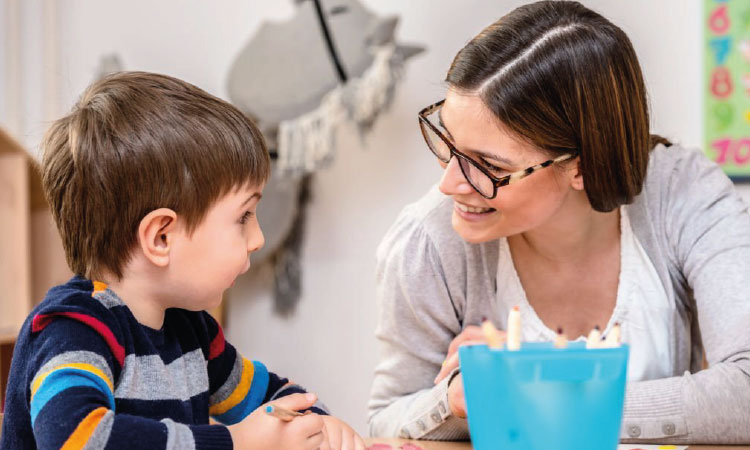Speech is an essential part of a toddler’s development. It helps them shape their interacting skills, listening skills and also impacts their behavior. In the initial stages of their development, babies begin making their own sounds to communicate. After some time they try imitating the sounds around them as a means to communicate with their parent. If your child hasn’t taken its first words yet, here are some ways to help you understand why and encourage your toddler to talk.
Talking can get frustrating for toddlers – they have so much to talk but they don’t really have the words to express themselves. It starts with babbling with your support and encouragement, they can achieve this milestone with ease.
At What Age Should A Toddler Speak?
Babies develop their ability to talk at their own pace. Most babies begin to communicate with their parent through a light cooing sound or cry.
From the child’s birth to 3 months, a baby begins to make cooing sounds. From 3 to 6 months of age, the baby begins to make more elaborate sounds like “baahh bahh” or “muh” to communicate.
Most doctors say that by 12 months of age, your toddler should start taking his first word. Most babies say words like “ma-ma“, “da-da” by their first birthday. Even if your child is not saying any words, there is no need to worry if you find that he is trying to talk, can understand you well and is making other sounds to communicate with you. A lot of babies communicate with gestures at this age, and also follow simple instructions like “No“, “Come” , “Eat” etc.
By the age of 18 months, most babies will speak about 10 words as an average. The more exposed they are to words and talking the more rapidly their vocabulary will grow. There will be a word spurt suddenly and toddlers can usually refer to themselves by their name when they turn about 2 years.
If by 15 months of age your toddler doesn’t say any words, consult a doctor for additional help. Your child should be able to understand simple words, follow simple directions and know about 10 words by the time they are 18 months old. According to Diane Paul-Brown, PhD, director of clinical issues at the American Speech-Language-Hearing Association (ASHA), “Some children develop language at a faster rate than others. Even so, there are times to have a child’s speech and language evaluated.”
A child always learns to speak words that begin with consonants like ‘d’, ‘n’ and ‘t’ because the tongue and the upper mouth are used in producing these sounds and it is easier.
Related Reading: 12 Fun And Learning (Activities For Babies 0-6 Months)
The letters that are formed at the farther end of the mouth will come into play later.
What Causes Speech Delay In Toddlers?

Your baby needs to hear, understand and express himself to achieve language milestones. Although when a child starts to speak, the words are far from perfect yet it is important that they do try to talk. Remember, every child masters the skill of talking at different ages, so whenever you visit the pediatrician, let them know your concerns.
Sometimes, children might develop their speech later than other children. Though this might not seem a big issue, there are other factors that could be the reason for your toddler’s speech delay.
- Speech and language disorders: Speech and language disorders are caused when the brain of the toddler works differently. They have trouble in understanding what other people are saying, are unable to produce speech sounds, etc. It is better to consult a paediatrician to be sure
- Oral impairments: Your toddler could have problems with the tongue or the palate. A short frenulum, which is the fold beneath the tongue could limit the movement of the tongue, thereby restricting your toddler’s speech
- Hearing problems: Sometimes toddlers are unable to speak because of hearing problems. They aren’t able to understand what others are communicating to them which makes it difficult for them to communicate and imitating other people’s words
- Physical/mental abuse: If a child has undergone a traumatic event, the trauma will prevent them from speaking like normal children
8 Tips On How To Encourage A Toddler To Talk
As a parent, the best you can do is to give your toddler your precious time and attention to make them develop their language skill. It’s not just a child’s journey, but yours too. Be with your child, talk as much as possible and encourage their efforts to communicate with the below tips –
1. Start talking to your child from birth
Start talking to your child since birth. By doing so you are making them accustomed to sound around them. Children draw their words from sounds that they hear around them and by constantly talking to your child, they will pick up words faster and start talking.
2. Read to them
Sit with your child and read to them. Use books with elaborate and colourful pictures so that when they get bored of the text, they can see the pictures and link them with words. Let your child flip pages and choose the story of his/her choice. By doing so, you’re creating an interest in them to learn how to speak.
Related Reading: 10 Ways To Encourage A Baby To Walk- Mini Steps!
3. Establish a two-way communication
It is important to establish a two-way communication with your child from the beginning. Talk to your child and understand how they react to your talking.
Notice their gestures when you say something to them or sing to them. By doing so, you’ll be able to understand which behaviour of yours enforces positive reactions in them and can build more on that. Try to get a response to your communication from your toddler. If your toddler responds in non-verbal actions such as face expressions, smile, etc. it means that your toddler is taking an interest in communication and language.
4. Don’t try to correct them

There’s a tendency for your toddler to get words wrong. They might even babble words that don’t mean anything. Don’t try to correct them as it will discourage them from making such sounds in future. Let them make up new words and encourage them by using those words in front of them. It will encourage their speech.
5. Repeat words in front of them
You can choose a few simple words like Mama, Dada, Papa, etc. and use them repeatedly in front of your child. When babies hear a word repeatedly, they tend to imitate and repeat the word. Begin with words that are easy to pronounce. Once your toddler says its first words, it will become easier for them to start talking.
Related Reading: The 10 Worst Things You Can Say To Your Child
6. Use gestures
While talking to your baby, use gestures. Toddlers like to imitate speech when it is paired with movements. When reading an animal picture book, you can point towards the cow and say “Moo” and your child will try to imitate the same. You can also pick up toys like cars and say “Vroom Vroom” or say “Peep Peep” with a toy truck. Your toddler will get excited while watching you make those sounds and will try to make the same sound when they play with those toys.
7. Don’t rush it
Many times when you see other parents around you talking about their toddler’s first words, you tend to get anxious and nervous about it. In an attempt to get your toddler talking, you unconsciously force them by telling them to say something. If you try to rush it, it will discourage your child to speak. Understand that each child takes its own time and your child too, will eventually start speaking.
8. Sing to your child

Singing to your child will help them recognize sounds better. Hearing new sounds will help them in leaning new words. Learning new sounds also keeps them positive and happy. It also helps them improve their memory and listening skills along with their speaking skills.
If your toddler hasn’t taken his/her first words yet but is still blabbering, it is a positive sign. Blabbering is also a form of verbal communication and it means that your toddler is beginning to form words. It’s only a matter of time when your toddler starts forming words. It is always safe to consult a pediatrician to make sure that your toddler’s late development isn’t anything serious.

